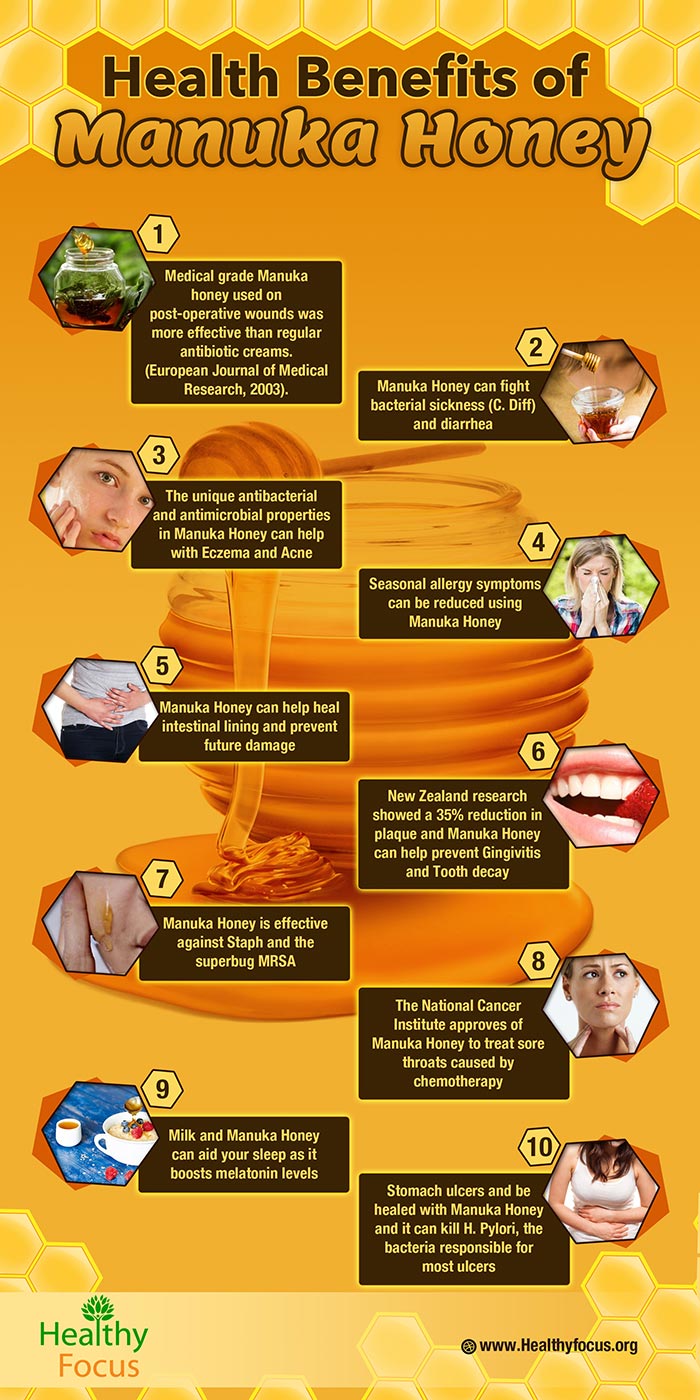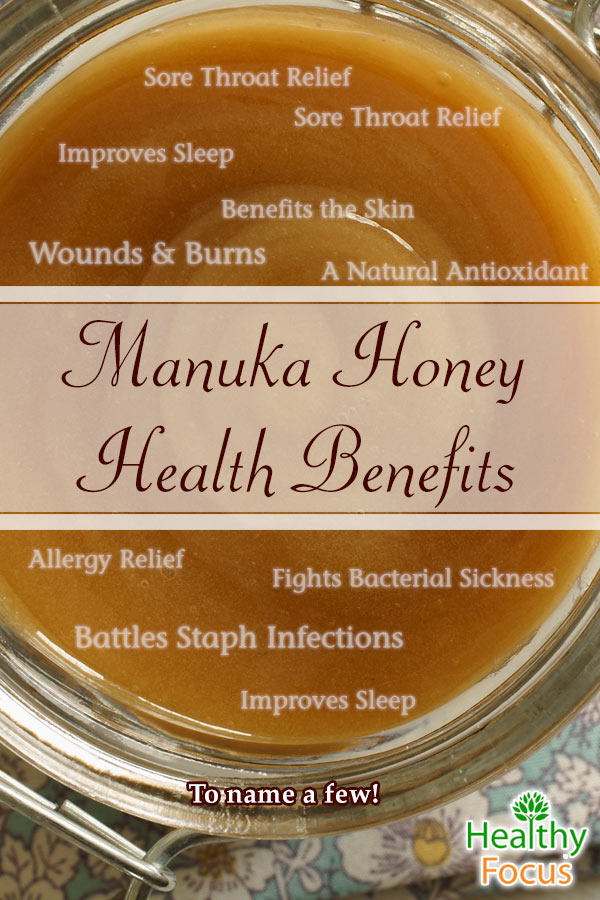What is Manuka Honey?
Most honey tastes great and is generally considered to be good for you. There is a long history of honey being used for its curative properties dating back thousands of years; long before the discovery of modern antibiotic medications.
In the 19th Century, science managed to catch up with tradition when the natural antibacterial qualities of honey were discovered. However, not all honey is created equal and manuka honey is not any old honey. Bees create a number of edible products in addition to honey.
Propolis is a brown or red substance collected by bees from trees and plants. The bees use this substance to fill cracks and seal in the honeycomb. Manuka propolis, like manuka honey has unique properties and higher levels of flavenoids than other propolis. You will often see Manuka honey and manuka propolis mentioned together. While they both are beneficial-they are distinct from each other and provide different health benefits.
Manuka honey is produced by the bees which pollinate the flowers of the manuka bush, also known as the tea tree, native to New Zealand. Indigenous New Zealanders have been aware of its health applications since ancient times and these days manuka honey is lauded as a treatment for a range of issues from sore throats to the healing of wounds and ulcers.
Like all Honey—there are regular nutrition benefits to Manuka honey as well. Mauka honey contains B vitamins and some amino acids. Honey is relatively rich in manganese there are other beneficial trace minerals such as Iron, Zinc and Copper.
Vitamin and mineral-based nutrition is not where Manuka shines. Primarily, it is all of the extra active ingredients unique to Manuka that make it so healthy. Manuka contains many active healing components—more than regular honey.
The reputation of honey as a natural wound treatment owes a lot to its antibacterial ability which protects against bacterial damage; but honey also has anti-inflammatory properties that can effectively minimize pain and swelling.
Not all honey is so effective however and manuka honey in particular has developed a deserved reputation as the best of the lot.
So what is it about manuka honey that makes it such a special kind of produce?
Manuka Honey Infographic

To start with, the nutritional value is several times greater in most strains of manuka honey than in more ordinary flower honey. Researchers from Waikato University also discovered in the early 1980s that manuka honey contained significantly greater levels of enzymes than other honeys.
This is important because these enzymes are responsible for creating hydrogen peroxide which works as a natural antibacterial. While most regular honeys contain hydrogen peroxide, manuka honey also contains another antibacterial compound called methylglyoxal.
This non-peroxide component is also called the Unique Manuka Factor (UMF)—since it is only in Manuka Honey. Methylglyoxal or MG which is produced via the conversion of the dihydroxyacertone present in high levels in the nectar of the manuka flower. It is these compounds which are largely responsible for the medical and healing properties of manuka honey.
The higher the level of active methylglyoxal, the more potent is the antibiotic effect of manuka honey and producers now use a global standard scale to guide consumers based on the Unique Manuka Factor (UMF). While manuka honey is available to be enjoyed in itself at table grade value, in order to be considered of therapeutic use it must have a minimum 10 UMF rating.
The higher the UMF the more expensive it is so you should try and match the UMF to what the need is. For something minor a 10+ UMF might be sufficient but to get the highest anti-bacterial and healing factors 16+ is the way to go. More on the UMF ratings, MGO ratings (another standard to make things even more confusing) and values later.
Manuka Honey Health Benefits
Thousands of years of tradition suggest that active manuka honey has a number of health benefits and can be used to treat a range of medical issues. Modern research has started to back up these historical claims.
While some of the medicinal uses of active manuka honey are well established not all of them are. As with many natural cures, it should be noted that more research needs to be done in the future.
1. Wounds and Burns
Because of its potent antibacterial and anti-inflammatory properties, one of the most well-known applications for manuka honey is as a wound or burn treatment. A study published in 2003 in the European Journal of Medical Research stated that medical grade manuka honey used on post-operative wounds was more effective than regular antibiotic creams.
It is widely applied externally in hospitals to treat unresponsive wounds and bed sores. The use of manuka honey in dressing wounds has been licensed by the National Health Service of the UK since 2004.
2. Manuka Honey Benefits for Skin
In addition to helping with burns and wound–Manuka Honey is a great addition to your skincare routine. The evidence that manuka honey can be used as a skin treatment is purely anecdotal and there have been no clinical trials to date but the internet is awash with positive claims about its ability to help with eczema and clear up acne as well as other skin conditions.
If you want to try manuka honey on your skin, it certainly will not do you any harm. Simply massage the honey into the affected areas of your skin and let it sit for a couple of minutes before washing it off with soap and water. If your skin conditions stem from bacteria overgrowth there is a good chance Manuka honey will help.
Eczema and acne
Despite the fact that there have been no clinical trials to date, it does not mean that manuka honey is not effective for the skin. Indeed, a cursory look around the internet will lead you to countless testimonials from people who are thrilled with the effect that manuka honey has had on chronic skin disorders such as acne, eczema and rosacea. It is not difficult to imagine that these testimonials have a ring of truth around them especially when you take into account the proven antimicrobial abilities and general healing properties of the honey.
There are several ways that you could use manuka honey to treat your skin. You could simply apply the honey to the affected areas and allow it to sit in place for a few minutes or use manuka to make a homemade natural face mask or scrub.
3. Bacterial Sickness – C Diff
Owing to its natural antibacterial properties, manuka honey is an effective weapon in the fight against bacterial disorders. A recent study published in 2013 set out to investigate the effectiveness of manuka honey on a particular virulent bacteria.
Clostridium difficile, which is one of the biggest sources of infectious diarrhea in the world was the focus of the research. The study discovered that manuka honey was effective against the bacteria and was a potential source of future treatments against bacterial infection.
The special content of Manuka honey is also believed to be effective in balancing the acidity of the digestive system and able to reduce acid reflux.
4. Staph Infections (MRSA)
Due to the overuse of antibiotics, certain infectious diseases have become very problematic. Certain staph infections including the so-called super bug MRSA have become resistant to antibiotic treatment
Consequently, the medical community is looking for effective treatments to fight MRSA. Research suggests that manuka honey is effective against certain proteins that MRSA needs to synthesize and build. More research is ongoing but the early signs look positive.
Cardiff University researcher Professor Rose Cooper explains that many chronic wounds develop bacteria within a biofilm making them less susceptible to treatment with antibiotics. She goes on to say that:
[su_quote url=”http://www.cardiffmet.ac.uk/news/Pages/Cardiff-Met-researcher-wins-top-industry-award-for-combatting-MRSA-with-manuka-honey-.aspx”]“Manuka honey can inhibit the growth of these biofilms in the laboratory, giving it the potential to control superbug infections such as MRSA. It will inhibit MRSA by stopping cells from dividing, which makes it such an interesting product to work with.”[/su_quote]
5. Allergies
Based on research into regular honey and birch honey, manuka honey is likely to be effective in reducing the symptoms of seasonal allergies. Results of the research revealed that those who used honey of any kind significantly improved their hay fever symptoms compared to the control group.
While this research did not specifically test with manuka honey, it established that both birch honey and regular honey were compelling treatments and manuka honey is likely to be just as effective.
6. Gingivitis and Tooth Decay
This is more very good news for those of you who suffer from dental issues. Scientists in New Zealand’s University of Otago have revealed that sucking on manuka honey products reduces the amount of plaque on your teeth by as much as 35%.
Not only is it effective in fighting plaque but it the same researchers found that manuka honey significantly reduced bleeding in gingivitis sufferers. Given that manuka honey is a rich source of compounds which are essential for healthy teeth such as zinc, calcium and phosphorus; this all adds up to very good news for keeping the dentist at bay.
Check out this article for more information on natural cavity care options.
7. Sore Throat
Honey has been used as a home remedy for sore throats for centuries; there is evidence that manuka honey is especially effective in preventing the growth and spread of the strep bacteria responsible for causing sore throats. The National Cancer Institute recently approved the use of manuka honey to treat sore throats caused by chemotherapy.
It should also help with coughs and colds. The antibacterial and antimicrobial action will help get any overgrowth in order. Manuka and manuka propolis lozenges are a good option for sore throats.
8. Molluscum Contagiosum
Molluscum contagiosum is a relatively common and benign viral skin infection that typically affects children but can also occur in adults. It is characterized by small firm bumps of the skin. The bumps are painless but can be itchy or inflamed and if they are injured or scratched, the infection might spread to surrounding areas of the skin.
Molluscum contagiosum is spread through direct contact with infected people or from contaminated objects. Left untreated, the symptoms generally disappear in a year or so but manuka honey is a treatment option that has proven fairly successful.
There is no scientific research to confirm its effect on the infection but Molluscum contagiosum forums are full of excellent tributes from parents that have used it to treat their children. Many of these parents say that manuka honey when applied directly to the affected areas can help the bumps disappear within a week or so and seems to keep new symptoms at bay.
9. Clostridium Difficile
Clostridium difficile is a bacterial infection that attacks the digestive system. It is a potentially serious condition that causes diarrhea, extreme abdominal cramps and fever. When left untreated, clostridium difficile might lead to further complications that can even be life threatening.
Recent research published in 2013 found that the clostridium difficile bacterium was very susceptible to manuka honey and the growth of the bacteria was significantly inhibited. Researchers concluded that manuka honey might be an effective method of treating clostridium difficile infections and that further research was warranted. (1)
10. Corneal Oedema
Corneal oedema is a post-operative complaint that prevents or delays the recovery of eyesight following eye surgery. Studies using antibacterial manuka honey eye drops between twice and three times a day in conjunction with conventional treatment have found that it can help reduce corneal oedema and improve vision. Researchers concluded that manuka honey drops were both a safe and effective way to manage corneal oedema and recommended further clinical trials. (2)
11. Anti-cancer activity
While its antibacterial and wound healing effects are well established, there is far less published research relating to the potential anti-cancer ability of manuka honey. A comprehensive study carried out over 5 years in the UAE and published in 2013 was conducted to examine the effect of manuka on three types of cancer both on mice and human cells in vitro.
The results indicated that manuka honey had a powerful anti-proliferative effect on all three lines of cancer on which it was tested; skin cancer, colon cancer and breast cancer. Manuka honey treatment resulted in tumor growth being inhibited by around 33% while manuka honey in combination with chemotherapy treatment resulted in a 61% inhibition in cancer growth.
The combination treatment also resulted in a significantly greater survival rate than animals treated with paclitaxel alone. Because of this, researcher suggested that manuka honey was a potentially novel method of alleviating toxicity caused by chemotherapy. The findings also suggested that apoptosis resulting in cancer cell death was the mechanism by which manuka honey was effective. (3)
Researchers were encouraged and excited by the findings; this might be the medical breakthrough that the world has been waiting for. According to Dr. Al Ramadi the evidence of the research so far suggested that manuka honey acted by stimulating various proteins within the cells causing apoptosis or cell death to occur.
This comprehensive study was conducted over a 5 year period and has generated a fair bit of excitement. The positive results of the research are expected to lead to further investigations of manuka honey as it relates to the treatment of cancer in humans.
12. To Improve Sleep
According to many users and also certain experts on the subject, manuka honey can be used to promote a deep and restful sleep. Anybody that has trouble sleeping will know how debilitating it can be. You often suffer daytime fatigue and lack of focus as well as many other unwanted consequences. Instead of going down the pharmaceutical route, you could do worse than trying manuka honey.
Honey like manuka slowly releases glycogen into the body which is important for bodily functions during rest and sleep. It also helps stimulate the release of melatonin into your brain which is essential for good quality sleep. Try adding a teaspoon of manuka honey to a warm glass of milk and drinking it each night before bed.
13. Inflammatory Bowel Disease
Research has found that manuka honey may be an effective natural weapon against inflammatory bowel conditions. Research published in 2008 set out to evaluate the effects of manuka honey on rats induced with inflammatory bowel disease.
What they discovered was extremely positive. All groups of rats treated with manuka displayed a reduction in colonic damage and inflammation, Not only did manuka honey help heal inflammation but it also reversed oxidative damage and offered protection from further damage.
14. A natural antioxidant
As well as all of its specific uses, manuka honey is also an excellent source of powerful antioxidants which can help reverse damage done by oxidative stress and may even help slow down or reverse the aging process. Antioxidants can protect us against serious disease and help the skin look and feel younger.
Recent research published in 2013 set out to measure the effectiveness of manuka honey on oxidative stress in rats. The animals were split into two groups and either fed with plain water or supplemented with manuka honey for 30 days. Researchers found that manuka reduced oxidative DNA damage and that its antioxidant effect was linked to its high phenolic content. (4)
What is Unique Manuka Factor (UMF)?
As I mentioned earlier in the article, manuka honey is graded on a scale known as the unique manuka factor. Manuka honey needs to have a UMF of 10 or more to be considered medicinal. Manuka honey below 10 may still have general health benefits associated with regular honey but manuka with a UMF of 10+, 15+ or 20+ is recommended for immediate medical treatment or preventative use.
There are also the MGO (methylglyoxal) and NPA (non-peroxide) ratings, which are on a completely different scale. These are still good honeys as they have the special active manuka content. Remember that all honey has peroxide activity and it is the NPA and MG (or UMF) which is unique to Manuka Honey.
Some “manuka Honey” may say peroxide activity or total activity—and should be avoided. As long as there is UMF/MGO or NPA—you know the active manuka content is measured in some way.
I have found this table to be very helpful to compare roughly equivalent UMF/MGO and NPA ratings:
http://export-x.com/2014/05/29/manuka-honey-mgo-umf-ratings-compared/
There is actual research correlating these ratings so they are good.
Comvita is a well known and trusted brand that we recommend. If you have a Trader Joe’s grocery store nearby–they sometimes will have a good deal on a UMF 10+ Manuka.
How to Use Manuka Honey
- You can apply manuka honey directly to the skin to help soothe bites, minor wounds, cuts and skin infections.
- Swallow a spoonful to ease your sore throat.
- Add it to your juice, milk or cup of hot drink to maintain your general health; manuka honey retains its antibacterial quality even after boiling.
Manuka Honey Side Effects
- There are no known side effects to taking manuka honey either orally or topically but it is not considered safe for babies under 12 months old because it is a source of the bacterial spores that can cause botulism.
- Diabetics should limit their honey intake owing to its high content of glucose.
(1) http://www.ncbi.nlm.nih.gov/pubmed/23651562
(2) http://www.ncbi.nlm.nih.gov/pubmed/26390910
(3) http://www.ncbi.nlm.nih.gov/pmc/articles/PMC3567021/
(4) http://www.ncbi.nlm.nih.gov/pubmed/24270958




Leave a Reply
You must be logged in to post a comment.